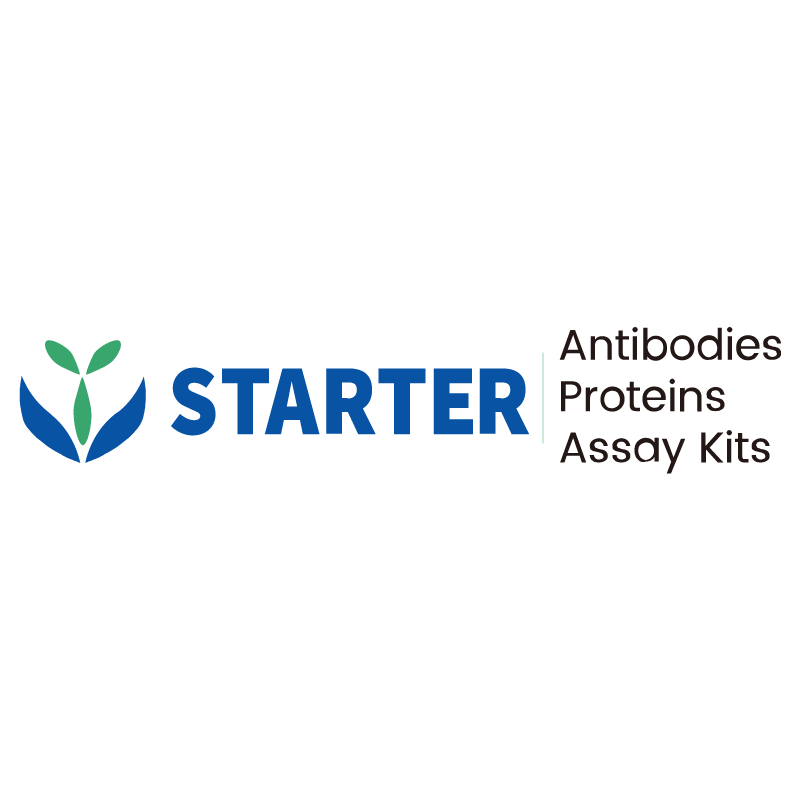WB result of SMAD2 Recombinant Rabbit mAb
Primary antibody: SMAD2 Recombinant Rabbit mAb at 1/1000 dilution
Lane 1: HeLa whole cell lysate 20 µg
Lane 2: HT-1080 whole cell lysate 20 µg
Secondary antibody: Goat Anti-Rabbit IgG, (H+L), HRP conjugated at 1/10000 dilution Predicted MW: 52 kDa
Observed MW: 60 kDa
Product Details
Product Details
Product Specification
| Host | Rabbit |
| Antigen | SMAD2 |
| Synonyms | Mothers against decapentaplegic homolog 2; MAD homolog 2; Mothers against DPP homolog 2; JV18-1; Mad-related protein 2 (hMAD-2); SMAD family member 2; MADH2; MADR2 |
| Immunogen | Synthetic Peptide |
| Location | Cytoplasm, Nucleus |
| Accession | Q15796 |
| Clone Number | S-1420-20 |
| Antibody Type | Recombinant mAb |
| Isotype | IgG |
| Application | WB, IHC-P, ICC, IP |
| Reactivity | Hu, Ms, Rt |
| Positive Sample | HeLa, HT-1080, NIH/3T3, mouse brain, C6, rat brain |
| Predicted Reactivity | Bv, Or |
| Purification | Protein A |
| Concentration | 0.5 mg/ml |
| Conjugation | Unconjugated |
| Physical Appearance | Liquid |
| Storage Buffer | PBS, 40% Glycerol, 0.05% BSA, 0.03% Proclin 300 |
| Stability & Storage | 12 months from date of receipt / reconstitution, -20 °C as supplied |
Dilution
| application | dilution | species |
| WB | 1:1000 | Hu, Ms, Rt |
| IP | 1:50 | Hu |
| IHC-P | 1:100-1:200 | Hu, Rt |
| ICC | 1:500 | Hu |
Background
SMAD2 is a key intracellular signaling protein that plays a central role in the canonical transforming growth factor-beta (TGF-β) signaling pathway. SMAD2 is activated when TGF-β superfamily agonists bind to their receptors, leading to the phosphorylation of SMAD2. Once phosphorylated, SMAD2 forms a complex with SMAD4 and translocates into the nucleus to regulate gene expression1. SMAD2 is involved in a variety of cellular processes, including cell proliferation, differentiation, and apoptosis. It is also crucial in developmental processes, particularly in the patterning of the early embryo and the formation of the three germ layers. SMAD2-deficient mice exhibit early embryonic lethality, highlighting the essential role of SMAD2 in development. In the context of adult tissues and disease, SMAD2 has been implicated in the pathogenesis of various cancers, fibrosis, and cardiovascular diseases. It is often dysregulated in cancer, contributing to tumor progression and metastasis. In the heart, SMAD2 signaling has been shown to be important for cardiac development and responses to injury, such as myocardial infarction.
Picture
Picture
Western Blot
WB result of SMAD2 Recombinant Rabbit mAb
Primary antibody: SMAD2 Recombinant Rabbit mAb at 1/1000 dilution
Lane 1: NIH/3T3 whole cell lysate 20 µg
Lane 2: mouse brain lysate 20 µg
Secondary antibody: Goat Anti-Rabbit IgG, (H+L), HRP conjugated at 1/10000 dilution Predicted MW: 52 kDa
Observed MW: 60 kDa
WB result of SMAD2 Recombinant Rabbit mAb
Primary antibody: SMAD2 Recombinant Rabbit mAb at 1/1000 dilution
Lane 1: C6 whole cell lysate 20 µg
Lane 2: rat brain lysate 20 µg
Secondary antibody: Goat Anti-Rabbit IgG, (H+L), HRP conjugated at 1/10000 dilution Predicted MW: 52 kDa
Observed MW: 60 kDa
IP
SMAD2 Recombinant Rabbit mAb at 1/50 dilution (1 µg) immunoprecipitating SMAD2 in 0.4 mg HeLa whole cell lysate.
Western blot was performed on the immunoprecipitate using SMAD2 Recombinant Rabbit mAb at 1/1000 dilution.
Secondary antibody (HRP) for IP was used at 1/1000 dilution.
Lane 1: HeLa whole cell lysate 40 µg (Input)
Lane 2: SMAD2 Recombinant Rabbit mAb IP in HeLa whole cell lysate
Lane 3: Rabbit monoclonal IgG IP in HeLa whole cell lysate
Predicted MW: 52 kDa
Observed MW: 60 kDa
Exposure time: 38 s
Immunohistochemistry
IHC shows positive staining in paraffin-embedded human lung adenocarcinoma. Anti-SMAD2 antibody was used at 1/100 dilution, followed by a HRP Polymer for Mouse & Rabbit IgG (ready to use). Counterstained with hematoxylin. Heat mediated antigen retrieval with Tris/EDTA buffer pH9.0 was performed before commencing with IHC staining protocol.
IHC shows positive staining in paraffin-embedded human tonsil. Anti-SMAD2 antibody was used at 1/200 dilution, followed by a HRP Polymer for Mouse & Rabbit IgG (ready to use). Counterstained with hematoxylin. Heat mediated antigen retrieval with Tris/EDTA buffer pH9.0 was performed before commencing with IHC staining protocol.
IHC shows positive staining in paraffin-embedded rat spleen. Anti-SMAD2 antibody was used at 1/200 dilution, followed by a HRP Polymer for Mouse & Rabbit IgG (ready to use). Counterstained with hematoxylin. Heat mediated antigen retrieval with Tris/EDTA buffer pH9.0 was performed before commencing with IHC staining protocol.
Immunocytochemistry
ICC shows positive staining in HeLa cells. Anti- SMAD2 antibody was used at 1/500 dilution (Green) and incubated overnight at 4°C. Goat polyclonal Antibody to Rabbit IgG - H&L (Alexa Fluor® 488) was used as secondary antibody at 1/1000 dilution. The cells were fixed with 100% ice-cold methanol and permeabilized with 0.1% PBS-Triton X-100. Nuclei were counterstained with DAPI (Blue). Counterstain with tubulin (Red).


